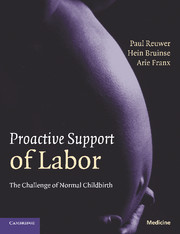Book contents
- Frontmatter
- Contents
- Foreword
- Acknowledgments
- Web-Forum
- 1 General introduction
- Section 1 A wake-up call
- Section 2 Back to basics
- Section 3 Proactive support of labor
- 12 Introductory synopsis
- 13 Nulliparous versus parous labor
- 14 Diagnosis of labor
- 15 Prevention of long labor
- 16 Personal continuity and continuous support
- 17 Amniotomy and oxytocin
- 18 Labor pain in broader perspective
- 19 Prelabor preparation
- 20 Medical pain relief revisited
- 21 Dynamic dystocia unraveled
- 22 Mechanical birth obstruction
- 23 Curtailed use of induction
- 24 Intrapartum care of the fetus
- 25 Prevention of litigation
- 26 Organizational reforms
- 27 Continual audit and feedback
- 28 Quality assessment
- 29 Hospital statistics
- 30 Sum of the parts
- Index
- References
16 - Personal continuity and continuous support
Published online by Cambridge University Press: 08 September 2009
- Frontmatter
- Contents
- Foreword
- Acknowledgments
- Web-Forum
- 1 General introduction
- Section 1 A wake-up call
- Section 2 Back to basics
- Section 3 Proactive support of labor
- 12 Introductory synopsis
- 13 Nulliparous versus parous labor
- 14 Diagnosis of labor
- 15 Prevention of long labor
- 16 Personal continuity and continuous support
- 17 Amniotomy and oxytocin
- 18 Labor pain in broader perspective
- 19 Prelabor preparation
- 20 Medical pain relief revisited
- 21 Dynamic dystocia unraveled
- 22 Mechanical birth obstruction
- 23 Curtailed use of induction
- 24 Intrapartum care of the fetus
- 25 Prevention of litigation
- 26 Organizational reforms
- 27 Continual audit and feedback
- 28 Quality assessment
- 29 Hospital statistics
- 30 Sum of the parts
- Index
- References
Summary
Giving birth is a parasympathetic process, a physiological condition that requires a feeling of ease, rest, comfort, confidence, and security. When these environmental conditions are not met, anxiety and fear inevitably trigger a stress response that inhibits uterine contractions and increases the likelihood of prolonged, dysfunctional labor (Chapter 7). Parasympathetic dominance in labor is best promoted by a one-on-one female companion and the personal attention of a trustworthy professional who watches over the parturient's safety and ensures that labor progresses. This is a double-edged sword: the demanding requirements of non-stop presence, personal commitment, and continuous labor support are strongly correlated with a fixed limit on the maximum duration of labor, because neither is possible without the other. Work schedules exceeding 12 hours are unrealistic.
Lack of supportive care
Until 50–60 years ago, childbirth was primarily a woman's world, one in which women of all cultures were attended and supported by other women during labor and delivery. Over the past 5–6 decades, however, hospitals have replaced the familiar environment of home. Physicians have replaced midwives for low-risk births and nursing staff have replaced female family members as supporters during birth. Childbirth in modern maternity centers currently subjects women to institutional routines, a lack of privacy, unfamiliar personnel, work shift changes, and other conditions as highlighted in Chapter 4 that inevitably undermine the parasympathetic process of birth.
Information
- Type
- Chapter
- Information
- Proactive Support of LaborThe Challenge of Normal Childbirth, pp. 131 - 137Publisher: Cambridge University PressPrint publication year: 2009
